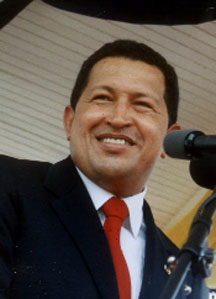CARACAS, (Reuters) – Venezuela’s flamboyant socialist leader Hugo Chavez said yesterday he had undergone a successful operation in Cuba to remove cancerous cells from a tumor and was on the road to full recovery.

The 56-year-old president looked grave and emotional in his first speech to the nation since surgery in Havana on June 10 that confirmed speculation he may have something serious.
“They confirmed the existence of a tumorous abscess, with the presence of cancerous cells, which required another operation to extract the tumor completely,” he said, standing at a lectern by a Venezuelan flag and a painting of South American independence hero Simon Bolivar.
“I deeply appreciate the demonstrations of solidarity by Venezuelans and other brotherly people.”
Chavez gave no indication of when he would return to Venezuela and did not name a temporary substitute to lead the South American OPEC member nation of 29 million people.
Analysts say his prolonged absence could prompt infighting among his allies — none of whom possess Chavez’s charisma or national appeal — and possibly bring calls for an early election by opposition parties gearing up for a 2012 poll.
Until Thursday, the official line had been that he was recovering well from an operation to remove a pelvic abscess and would return soon.
MINISTERS PLEDGE UNITY
Inheriting former Cuban revolutionary leader Fidel Castro’s mantle as Washington’s main irritant in Latin America, Chavez has become one of the world’s most well known leaders during his 12 years in power.
Chavez supporters reacted to his speech with disbelief but vows of solidarity.
“My comandante doesn’t have cancer. It can’t be true. He is the best president we have had, a strong man. He is not ill,” said Santiago Valledare, a driver watching the speech and saluting the screen on a TV in a Caracas bar.
Chavez’s ministers gave a joint appearance minutes after his speech ended, pledging to deepen his wide-reaching socialist reforms even in his absence and saying the government would remain united.
“This is not the time to go backward, it’s time to advance,” Vice-President Elias Jaua said.
Chavez’s appearance followed the release of a video on Wednesday of him walking and chatting with Castro, his friend and mentor.
“For now and forever we will live and we will conquer. Until my return,” Chavez said, ending his speech.
His government has canceled a July 5-6 summit coinciding with Venezuela’s 200th anniversary of independence. That was a heavy blow for supporters who wanted the charismatic but authoritarian president — who loves to grandstand at such big events — back home in time for the national party.
“Uncertainty is now intensifying in Venezuela,” said Diego Moya-Ocampos, a Venezuelan analyst at IHS Global Insight.
“A prolonged absence by Chavez could encourage a likely political crisis of unprecedented levels.”
